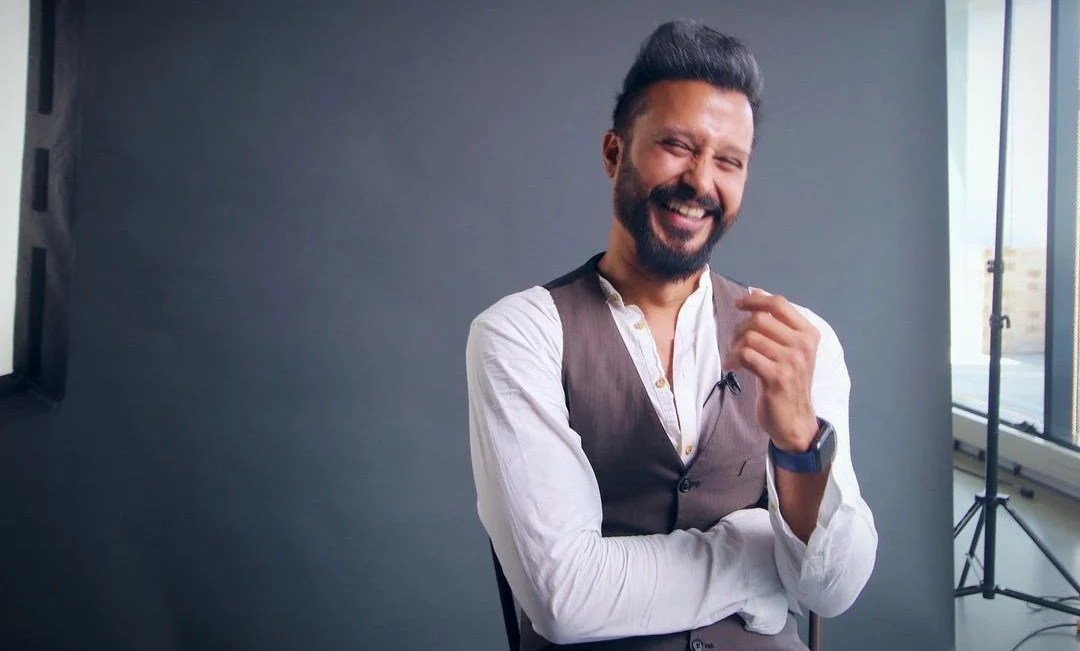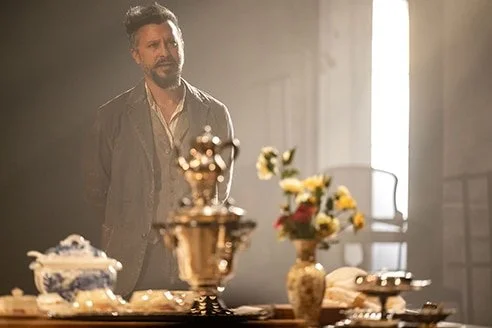Ali Kazmi Finally Feels On Top of the World
After establishing himself as a TV star in Pakistan, the actor had to start from scratch when he moved to Canada. Now, he’s found his groove.
Ali Kazmi. Supplied photo.
Ali Kazmi currently feels as though he’s on the top of the world.
He just finished playing Astrov in a sold-out run of Chekhov’s Uncle Vanya at Toronto’s Crows Theatre. Next, he’ll star in Bengal Tiger at the Baghdad Zoo and will appear in the third season of CTV’s Transplant alongside Hamza Haq and [Ali] Momen—“We were like, ‘Hey man, have we broken the Brown Multiverse [by all of us being] in one scene?” Kazmi jokes. Life is good.
But before it was good, it was fraught with disappointment, doubt, and a lot of closed doors which the Pakistani-Canadian actor, director, and producer worked hard to open—and he tells me all about it on a Google meet one Friday afternoon.
Ali Kazmi as the titular character in Uncle Vanya at Crow’s Theatre in Toronto. Photo: Dahlia Katz.
Kazmi always knew he wanted to be an actor.
As the son of Rahat Kazmi and Sahira Kazmi, two well-known actors (and director and producer in Sahira’s case) in Pakistani cinema, Kazmi grew up on sets and studios—even starring in a few shows when productions couldn’t find child actors.
“I just found this energy there that I just loved. I’ve always connected with that energy.” he says.
Kazmi recalls the exact moment that he fell in love with acting, too. He was about seven years old and played a younger version of his father’s character in the 1987 Pakistani drama Dhoop Kinare (literally: The Edge of Sunshine), which is now considered a classic.
“I saw the hustle bustle and the cameras, the people and…I felt so at home,” he remembers. “I found the beauty in the chaos, mujhe bauhat acha laga (I liked it a lot). I knew [then] that this is what I’m going to do for the rest of my life.”
Since then, Kazmi’s resolve to become an actor has never wavered—even after he had to rebuild his acting career in Canada from the ashes of the much more stable one he had left in Pakistan when he immigrated in 2008.
Through his teens and his early twenties, Kazmi starred in numerous Pakistani dramas—which are limited series produced in Pakistan, whose episodes vary in quantity and length, but typically have 10 or more episodes whose runtime is upwards of 20 minutes—and TV films, and built a name for himself.
Kazmi had always been cognizant of his parents’ legacy in Pakistan and had done his best to both bring it forward yet set himself apart from it by diversifying his roles and the genres they belonged to, instead of just playing “chocolate heroes.” But eventually, he began to long for more.
“I was like, ‘What else? Where’s the evolution? What else can I do?’” says Kazmi. “I want[ed] to work all over and I want[ed] to have the freedom to do different kinds of things.”
This desire, as well as marriage to his childhood sweetheart—who had studied at McGill and whom Kazmi would have studied alongside if 9/11 hadn’t happened—was what prompted Kazmi to move to Canada.
Though Kazmi says he didn’t experience too much of a culture shock—”It was kind of freeing to go grocery shopping in your pajamas,” he quips—it wasn’t an easy transition.
First there was the skepticism many desi people—whom Kazmi encountered during the odd jobs he did while enrolled in Toronto Film School—expressed in his ability to make it. Kazmi recalls some of them offering him his relatives’ contact information so he could be a taxi-driver or a real-estate agent. “I was like, ‘Come on guys. Where is the support?’” says Kazmi.
Then, there were the roles Kazmi auditioned for. “There were a lot of terrorist roles, a lot of roles with strong accents,” he recalls. “I was like, ‘This is not what I thought it would be.’ That was a real blow to the system.”
Yet Kazmi refused to give up. He auditioned for anything and everything, starring in The Indian Wants the Bronx for Toronto’s Fringe Festival and working his way up to director and producer at China Syndrome Productions, before eventually being cast in Deepa Mehta’s Biba Boys (2015)—his big break—and later Funny Boy (2020). After a six-year self-imposed exile to ensure he built himself in Canada first, Kazmi returned to Pakistani cinema with Jackson Heights (2014) and now oscillates between the two countries. Some roles Kazmi is particularly proud of—aside from those aforementioned—are Baaghi (2017), Badnaam (2017), Motorcycle Girl (2018), and Laal Kabootar (2019) as well as an appearance on the second season of Designated Survivor (2016—2019).
“I think you need to create your own opportunities and you need to be ready when opportunity knocks,” says Kazmi. “It’s like training for a marathon. If you’re not ready, you’ll fall down at the 10K mark. You won’t reach those 42 kilometres.”
When the pandemic hit, it inspired Kazmi to do some introspection. While reflecting on the shortness of life, further emphasized by the threat of COVID-19 and the things he’d like to accomplish during it, Kazmi found himself thinking of his first love—theatre.
“I was always afraid that there are not going to be interesting enough roles for South Asians in it,” Kazmi admits. But the pandemic inspired him to write to various theatres and express his enthusiasm to do table reads and help develop plays—and some of the theatres wrote back.
“I did table work for Terragon, Factory Theater, for the Royal Manitoba Theater, for the theatre in Winnipeg, [and] for Crows Theater,” he explains. “And at Crows, Chris [Abrams]—who’s the artistic director of Crows theater and is also the director of Uncle Vanya—and I really got along.”
So, when Abrams called Kazmi this summer to ask if he would be interested in playing Astrov in Uncle Vanya, it was an immediate yes.
“I was like,’ No, this cannot be real,” Kazmi remembers. “And he’s like, ‘Oh, really? Would you do it? I was like, ‘Yes! This is one of my favorite plays!’”
This is the role of a lifetime for Kazmi, not just because there have “never been any brown Astrovs in North America,” according to him, but also because his abba played the same role in an Urdu adaptation of play in 2007, just a few months before Kazmi immigrated. “I remember crying after that performance,” he says. After Kazmi got the role, he immediately called his father.
“We both were emotional on the phone,” Kazmi reveals. “He said beta, full circle, you’ve done it, you’re doing it, and you’re living the dream and I’m proud of you and, you know, that’s what you want to hear.”
Working on Uncle Vanya has been a “magical” experience for Kazmi. “Masha Allah the play’s going so well!” he says. “We’ve been sold out, the reviews have been great, and a lot of…great names have also come to watch it.” One of those names was Deepa Mehta, who Kazmi cites as a mentor.
“She was just like, ‘Beta, you can do this also!’” Kazmi chuckles. “That was really validating. I felt seen and I felt [as if] I’m on top of the world right now.”
It has also been really validating for Kazmi to be an inspiration to some of the theatre kids of colour who have come to see the play. “They look at me differently and say, ‘Man, way to go!’” Kazmi says with a smile. “I felt seen.”
While growing up in Pakistan, Kazmi, like many people of colour growing up in countries where Hollywood isn’t the dominant or only producer of media, didn’t give much thought to desi representation in Hollywood—or the lack of it.
However, he realized its importance after seeing the dearth of roles for South Asians when he first started auditioning—and especially after seeing his children express joy at seeing themselves on screen.
“When they watch Ms. Marvel, [my kids] are like ‘Hey dad, didn’t we hear that song in Karachi?” says Kazmi. “Even if they don’t say it, I know that they feel that she’s just like us—she’s us!”
“I think that everybody should have to feel that way,” Kazmi exclaims. “We didn’t have it growing up, but I’m glad people do now and I hope it continues to get bigger and better.


